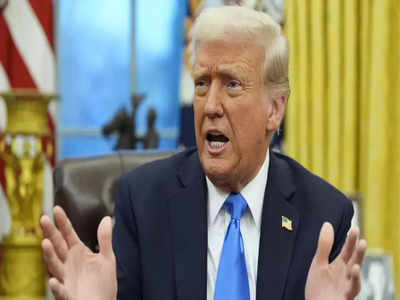“The Department of Education’s a big con job.” That blunt assessment from Donald Trump has resurfaced as the former president doubles down on his long-standing critique of the federal education system. With math and reading scores plummeting, elite universities slipping in global rankings, and educational disparities widening, Trump’s disdain for the Department of Education (DOE) is more than just rhetoric—it’s central to his vision of a state-controlled education system.
At the swearing-in ceremony of Tulsi Gabbard as Director of National Intelligence, Trump took an unexpected detour, slamming the DOE as a wasteful bureaucracy. He argued that education should be fully regulated by states, pointing to models like New York’s county-based governance as a potential alternative. Comparing the US to China, which consistently ranks among the top five in global education metrics, Trump painted the DOE as a symbol of federal inefficiency and academic decline.
This isn’t just talk. Under his administration, federal education funding faced freezes, and proposals to dismantle the department gained traction. For Trump, the DOE isn’t just ineffective—it’s unnecessary. Let’s find out why.
Massive spending, minimal results: A failing investment
Trump has continuously pointed to what he views as a glaring paradox: US invests more per student than any other country in the world, yet it ranks 40th on global education rankings. He contends that vast financial resources flowing to the allocated Department of Education (DOE) have not translated into establishing academic benchmarks. Instead, he claims the system is embedded and ingrained with inadequacies with billions wasted on programmes that fail to improve student performance. His administration has pushed for spending cuts, contending that redirected funds to state-controlled initiatives would yield better outcomes.
Another instance adding weight to the President’s stance is the stark results of the National Assessment of Educational Progress which shows plummeting scores of students in Maths and Reading Comprehension. The report highlights that fourth and eighth graders are still combatting the long shadow cast by the pandemic. It has also highlighted that there is a widening gap between the low scorers and high achievers. Recent data indicates a decline in student performance since 2019, with fourth-grade reading scores dropping from 220 to 215 and eighth-grade scores decreasing from 263 to 258 on average. The downturn is especially significant among students who are already facing literacy challenges, further augmenting the educational gap.
Bureaucracy over students: A bloated federal system
Labeling the US Education Department as a “con job” and asking for its immediate shuttering, Trump has also contended that the DOE has become a massive bureaucratic entity that impedes education controlled by state and local governments, rather than dictated by federal mandates that may not align with regional needs.
By scrapping the DOE, he argues, schools could be more flexible, responsive, and free from unnecessary administrative red tape. His stance reflects a broader conservative argument that education reform should prioritize decentralization and parental choice over federal oversight.
Squandering taxpayer’s money
Trump has alleged the DOE of mismanaging taxpayer dollars by funding what he sees as politically driven curricula, such as critical race theory (CRT) and diversity training programs. His administration has taken steps to defund such initiatives, arguing that federal education policies should focus solely on core subjects like math, science, and literacy, rather than ideological instruction. He has formulated the DOE as an institution that fosters government overreach and implements academic standards that do not echo all the values of all American families.
Is the DOE really a ‘Con Job’? A look at its track record
President Trump’s criticism of the Department of Education (DOE) as a wasteful bureaucracy cannot be dismissed outright. But has the agency always been ineffective? That remains a matter of debate. While critics argue that federal oversight has failed to deliver results, the DOE has undeniably played a crucial role in supporting millions of students through funding, policies, and nationwide education initiatives. Here’s how the department has performed over the years—and whether Trump’s claims hold weight.
Increased access to higher education
The DOE has played an instrumental role in enhancing college accessibility through numerous programmes such as Pell Grants and federal student loans. These federal programs have enabled millions of low-income students to pursue higher education.
Support for students with disabilities
With beneficial laws onboard such as the Individuals with Disabilities Education Act (IDEA), the DOE has ensured that students with disabilities receive appropriate educational services, fostering inclusivity and equal opportunities.
Funding for underprivileged schools
Programs such as Title I funding provide financial assistance to schools serving low-income communities, helping bridge educational disparities and improving resources for disadvantaged students.
Setting national educational standards
The DOE has been instrumental in developing initiatives like the Common Core State Standards, ensuring consistency in education quality across states, and helping students remain competitive in a globalized world.
Civil rights protection in schools
The DOE enforces anti-discrimination laws through the Office for Civil Rights (OCR), ensuring that schools uphold policies that promote equality regardless of race, gender, or disability.
A crossroad for US education: Reform or ruin?
Trump’s scathing criticism of the Department of Education has yet again fanned the flames of the discourse regarding the role of federal oversight in education. Proponents of dismantling the DOE claim that bidding adieu to DOE can eliminate bureaucratic inefficiencies and empower the states to become more responsive and pick cost-effective education policies.
On the other hand, opponents forewarn that shuttering the department could dismantle the crucial programme, widening educational disparities, and leave vulnerable students without support.
As the land of opportunities encounters a decline in global education rankings, the pressing issue at the forefront is not just whether or not the DOE keeps breathing, but how education can be reformed to cater to students in a better way.




